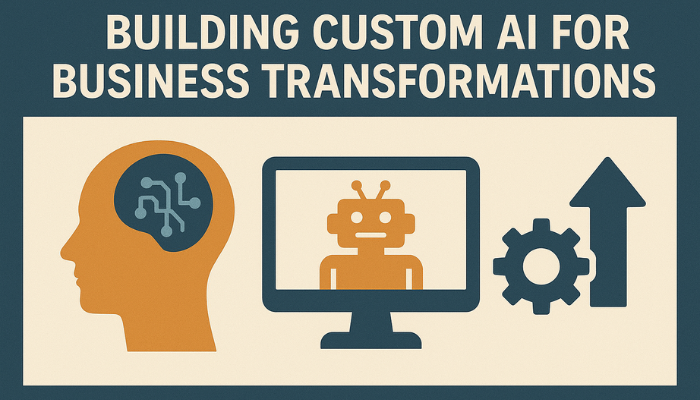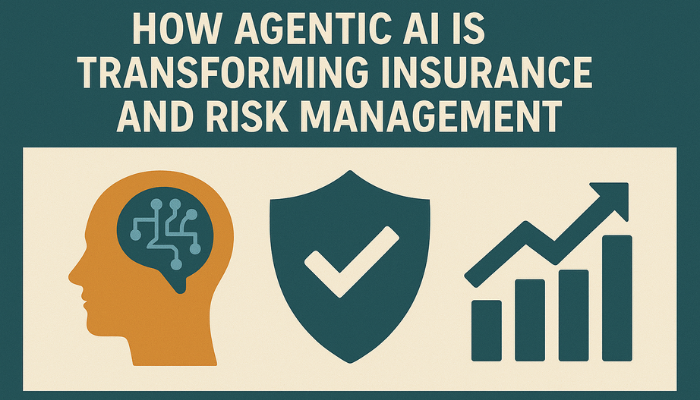If you’ve ever felt that generic AI tools don’t quite fit the way your business operates, you’re not alone. Many companies today face the same issue: off-the-shelf solutions often miss the mark when it comes to unique workflows, goals, or data. That’s where custom AI comes in. It gives you the power to design intelligent systems that align perfectly with your business processes, drive efficiency, and support smarter decisions.
In this blog, you’ll learn why custom AI is key to real business transformation and how key business functions are transformed. We’ll cover how to build a tailored AI solution, the top tools to use, and how to overcome common challenges, giving you a clear, practical path to make AI work for your business.
Why Custom AI Is Crucial for Business Transformation
Growing a business today means facing constant change, tighter competition, and rising customer expectations. Here are some of the reasons why it’s such a powerful driver of real transformation:
1. Solves Unique Business Challenges
Every business operates differently, with its own goals, systems, and market challenges. Off-the-shelf AI tools often take a one-size-fits-all approach that doesn’t match your exact needs. Custom AI, on the other hand, is designed specifically for your business. It helps you solve problems that are unique to your operations, whether that’s optimizing a supply chain, improving compliance, or managing industry-specific workflows.
2. Drives Competitive Advantage
Custom AI gives you a clear edge over competitors by enabling innovation that’s hard to replicate. You can create smarter services, automate specialized tasks, and respond to customer needs more effectively. These tailored capabilities allow your business to move faster, stay ahead of trends, and offer value that your competitors simply can’t match.
3. Boosts Efficiency and Productivity
AI built around your internal systems and processes can significantly streamline daily operations. It reduces manual and repetitive tasks, speeds up decision-making, and eliminates bottlenecks. As a result, your team can focus more on high-impact work, leading to better use of time, resources, and talent across the organization.
4. Enables Data-Driven Decisions
With custom AI, your business data becomes a strategic asset. It helps you turn raw information into actionable insights that are relevant to your goals, whether that’s predicting customer behavior, managing inventory, or refining pricing strategies. This leads to smarter, faster decisions grounded in facts, not guesswork.
5. Scales with Your Growth
As your business grows or enters new markets, your needs evolve. Custom AI solutions are built with flexibility in mind. You can add new features, integrate them with different systems, or adjust models as your business changes, without needing to start from scratch. This makes it a future-proof investment.
6. Enhances Customer Experience
Today’s customers expect personalized and responsive service. Custom AI helps you deliver just that, tailored product recommendations, faster support, and more relevant communication. It improves how you engage with customers at every touchpoint, building stronger relationships and long-term loyalty.
7. Aligns with Your Business Strategy
Most generic AI tools require your team to adapt to how the software works. Custom AI flips that around. It’s designed to fit your strategy, not the other way around. This means your digital tools support your long-term vision, helping you lead with purpose rather than react to change.
Want to reduce customer wait times without expanding your team?
We make custom conversational AI and chatbots. You can offer real-time, 24/7 customer support using video avatars or chatbots that handle everyday queries and free your team for high-value work.
Book a call and see how it fits your support strategy.
Also Read: Using AI to Enhance Customer Experience
You’ve seen why Custom AI is essential, now let’s explore the core functions it can optimize, automate, and elevate in your business.
Key Business Functions Transformed by Custom AI
Custom AI isn’t just about improving one area, it can reshape how your entire business runs. From daily operations to long-term strategy, here’s how it transforms key functions across your organization for better efficiency, smarter decisions, and stronger growth.
1. Operations and Process Automation
Custom AI helps simplify and speed up complex internal processes by automating tasks that typically drain time and resources. Whether it’s entering data into multiple systems, reviewing contracts, approving invoices, or processing compliance documents, AI handles it all with minimal human input.
For example, AI can read scanned documents using OCR (optical character recognition), extract key data, and route it to the right departments. It reduces human errors, ensures compliance, and allows your team to shift focus from manual oversight to strategic execution. This directly impacts productivity, lowers operational costs, and improves turnaround times across departments.
2. Customer Service and Engagement
Custom AI takes your customer support to the next level by offering immediate, 24/7 responses through intelligent chatbots and virtual agents. These systems don’t just respond, they understand intent, analyze context, and adjust responses in real time. AI can automatically pull up a customer’s previous history, suggest the most relevant solution, or even resolve billing or shipping issues instantly.
When the issue is complex, it escalates it to a human agent, complete with all the context and history. On top of that, AI tracks customer behavior across channels and tailors future interactions, turning support into a growth opportunity. The result: faster resolution, lower support costs, and higher satisfaction and loyalty.
3. Data Analysis and Decision Support
Data is one of your most valuable assets, but without the right tools, it’s just noise. Custom AI turns massive datasets into clear, actionable insights by analyzing sales trends, customer behavior, performance metrics, financials, and more. For example, it can help forecast sales for specific regions, identify underperforming segments, or flag unusual spending patterns.
Unlike traditional BI tools, AI learns and improves over time, making predictions more accurate and timely. It supports real-time dashboards, alerts, and “what-if” analysis for better scenario planning. This level of intelligent decision-making helps reduce risk, seize opportunities faster, and align decisions with your long-term strategy.
4. Supply Chain and Inventory Management
Your supply chain is the backbone of your business, and AI makes it smarter and more agile. It analyzes historical sales, market demand, seasonal trends, supplier reliability, and shipping timelines to optimize inventory levels in real time.
AI can automate reorder triggers, track shipments with GPS and IoT data, and alert you about potential disruptions like weather delays or vendor issues. This proactive management helps prevent overstocking and stockouts, improves cash flow, and reduces warehousing costs. Whether you’re managing global sourcing or just-in-time delivery, custom AI keeps your supply chain responsive and cost-effective.
5. Marketing and Personalization
AI gives your marketing a powerful upgrade by analyzing customer data at a deep level, interactions, preferences, purchase behavior, and even real-time engagement. It segments your audience dynamically and personalizes messages across email, social media, web, and mobile.
For example, AI can recommend the best time to send an email, what product to highlight, or which discount to offer a specific customer. It also monitors campaign performance continuously, making real-time adjustments to improve results. By automating these insights and actions, you boost ROI, reduce marketing waste, and deliver content that truly resonates with each customer.
6. Revenue Growth and New Business Models
One of the biggest advantages of custom AI is its ability to spot patterns and opportunities that are easy to miss. It can analyze customer demand, competitor pricing, social sentiment, and even global trends to recommend new revenue streams.
For instance, AI might suggest bundling certain services based on past buying behavior or help set up usage-based pricing models that increase customer lifetime value. You can also simulate the performance of new business models before launching them. This foresight helps you stay ahead of market shifts, move quickly when opportunities arise, and innovate without unnecessary risk.
7. Human Resources and Talent Management
AI can transform how you attract, hire, and retain talent. It speeds up resume screening by matching job descriptions with relevant skills, experience, and culture fit using Natural Language Processing (NLP). It can also reduce bias in hiring by focusing on skill-based qualifications. Once candidates are shortlisted, AI schedules interviews, sends reminders, and collects feedback automatically.
Post-hiring, AI supports onboarding by guiding new employees through personalized learning paths and training modules. It can even predict when employees might be at risk of leaving and suggest proactive engagement strategies. This leads to faster hiring, lower churn, and a stronger, more aligned workforce.
8. Industry-Specific Transformations
- Healthcare
If you’re in healthcare, custom AI can help you improve both patient care and operational efficiency. You can automate tasks like appointment scheduling, billing, insurance claims, and updating electronic medical records, cutting down on admin work and reducing wait times.
On the clinical side, AI supports your medical staff by analyzing scans, spotting irregularities, and assisting in diagnosing conditions like cancer or heart disease. This leads to more accurate results, faster treatment decisions, and better overall outcomes for your patients.
- Finance
In finance, custom AI helps you strengthen fraud detection, streamline compliance, and manage risk with more precision. It tracks transactions in real time, flags suspicious activity before it becomes a problem, and supports smoother audits.
You can also automate KYC checks, reduce errors in financial reports, and offer your clients smarter, personalized investment advice. These capabilities not only protect your business but also build trust and enhance the client experience.
- Retail
If you run a retail business, AI helps you understand what your customers want, before they even ask. It predicts demand, manages inventory, and adjusts pricing based on real-time trends and competition.
You can use AI to personalize product recommendations, run smarter promotions, and deliver a seamless shopping experience online and in-store. With AI handling both the back-end operations and front-end engagement, you can boost sales, cut costs, and keep customers coming back.
Also Read: Understanding Generative AI and Its Impact on Business
Let’s now shift from outcomes to execution. These are the critical steps to developing and deploying Custom AI that delivers measurable business impact.
Steps to Building a Custom AI Solution for Your Business
Building a successful custom AI solution takes more than just picking the right technology; it requires a clear strategy, the right data, and seamless execution across your business. The following are the key steps to help you plan, build, and scale AI in a way that delivers real business value:
Step 1: Identify Business Needs and Opportunities
Before building any AI solution, you need to be clear about what problem you’re solving or which opportunity you’re targeting. A strong foundation starts with the right focus.
- Spot Process Gaps: Look at where delays, bottlenecks, or manual work are slowing you down, whether it’s in operations, customer service, or finance.
- Set Clear Goals: Define what success means. Are you trying to reduce turnaround time, cut costs, increase sales, or improve customer experience?
- Tie AI to Strategy: Make sure the AI initiative supports your bigger business goals so the solution delivers real, measurable value.
Step 2: Collaborate on Solution Design
Designing the right AI solution is a team effort. Involving the right people early helps shape a system that actually works for your business.
- Engage Key Stakeholders: Involve leadership, IT, operations, and compliance teams to ensure alignment and gather diverse input.
- Define Features and Expectations: Be specific about what the AI should do, automate a task, predict an outcome, or support a process.
- Choose a Development Path: Decide if you want to build in-house, outsource to an AI partner, or go with a blended approach based on your capabilities.
Step 3: Prepare and Organize Your Data
Your AI’s performance depends heavily on the quality of your data. Well-prepared data leads to more accurate, trustworthy results.
- Collect Relevant Data: Pull data from across your systems, CRM, ERP, support logs, or any other business tools.
- Clean and Standardize: Remove duplicates, fix errors, and make sure formats are consistent and usable.
- Ensure Compliance: If you’re in a regulated industry, double-check that your data meets privacy, security, and compliance standards.
Step 4: Develop and Test AI Models
Now it’s time to bring your idea to life. This phase involves building and refining the AI models using your data.
- Choose the Right Tools: Pick AI technologies and frameworks that align with your goals, like machine learning, NLP, or computer vision.
- Train the Model: Use your organized data to help the AI learn patterns, make predictions, or automate tasks.
- Run Real-World Tests: Validate the model using real or simulated business scenarios to check for accuracy, fairness, and reliability.
- Refine for Performance: Improve the model based on test results before deploying it in a live setting.
Step 5: Integrate AI into Your Systems
Your AI solution should feel like a natural extension of your business, not a disruption. Integration is where this becomes real.
- Connect with Existing Tools: Integrate the AI into platforms your team already uses, like CRMs, help desks, or inventory systems.
- Ensure Smooth Workflows: Make sure the AI fits into your current processes without slowing things down or causing confusion.
- Train Your Team: Provide hands-on training so your employees know how to use the AI effectively and see its value in action.
Step 6: Gather Feedback and Optimize
Even after deployment, there’s always room to improve. Listening to feedback helps the solution evolve with your business.
- Collect User Feedback: Talk to the people using the system daily. What’s working? What’s frustrating? What could be better?
- Track Key Metrics: Monitor usage, speed, accuracy, and business impact to understand how the AI is performing in the real world.
- Fine-Tune the System: Use this feedback to adjust features, retrain the model, or improve the user interface.
Step 7: Monitor, Maintain, and Scale
To get long-term value from your AI, it needs to be maintained and scaled as your business grows.
- Set Up Ongoing Monitoring: Keep tabs on how the AI is performing, especially as new data flows in or business needs change.
- Update the Model Regularly: Retrain the system with fresh data and new rules to keep it relevant and accurate.
- Expand Across Teams: Once the solution is working well in one department, explore how you can roll it out to others for broader impact.
Need to predict demand or prevent downtime?
Our Predictive Modeling and AutoML solutions are built to forecast trends, spot risks, and help you stay ahead, without needing a full data science team.
Contact Us to explore a tailored AI roadmap for your operations.
Now that you know the steps, it’s time to explore the platforms that can help you build and scale your Custom AI solutions effectively.
Top 6 Platforms and Tools for Custom AI Development
Choosing the right platform can make all the difference when building custom AI solutions that actually work for your business. Below is a carefully curated list of the six top platforms. You’ll find what makes each one unique and what key features you can count on.
1. DigitalOcean GenAI Platform
DigitalOcean’s GenAI Platform makes AI development fast and accessible, even if you don’t have a team of data scientists. You can create AI agents for tasks like customer support or document handling, using powerful models from leaders like Meta and Anthropic. The platform adapts to your tools and workflows, which means you can get started quickly without deep technical knowledge.
Key Features:
- Access to third-party foundational models for tasks like chat, image generation, and document processing.
- Build agents tailored to your data and business context.
- Combine structured data from APIs and databases to support advanced use cases like Retrieval-Augmented Generation (RAG).
- Add safety and compliance guardrails to match your industry needs.
- Deploy seamlessly with private endpoints and built-in chatbot interfaces.
- Framework-agnostic setup, good for moving from idea to full-scale solution smoothly.
2. OpenAI API
If you’re looking to add advanced generative AI to your business apps, OpenAI’s API is a solid choice. It gives you direct access to powerful models like GPT-4 and DALL·E, making it easy to build tools for content generation, coding, customer service, or automation.
Key features:
- Use world-class language and image models.
- Plug-and-play API setup for quick integration into your systems.
- Fine-tune models to match your business use case.
- Supports both small and large-scale deployments.
- Strong developer support and thorough documentation.
- Enterprise-level controls for data privacy, security, and compliance.
3. Google Cloud Vertex AI
Google’s Vertex AI offers a full suite for building, training, and deploying AI at scale. It’s built for companies that want both flexibility and deep integration with other Google services. Whether you’re using prebuilt models or building custom ones, this platform covers the entire AI lifecycle.
Key features:
- Unified tools for preparing data, training models, tuning, and deployment.
- AutoML lets you build models without coding expertise.
- Works seamlessly with BigQuery, Google Cloud Storage, and other Google services.
- Built-in MLOps features for model tracking, versioning, and governance.
- Access to Google’s large language models and custom training options.
- Meets strict enterprise-grade security and compliance requirements.
4. Microsoft Azure AI
Azure AI combines machine learning and generative AI with Microsoft’s trusted cloud tools. If your business already uses the Microsoft ecosystem, this platform makes it easier to add smart capabilities without disrupting your workflow.
Key features:
- Ready-to-use AI services for tasks like speech recognition, language understanding, and decision-making.
- Build and train your own models using Azure Machine Learning.
- Responsible AI tools to support transparency and bias monitoring.
- Tight integration with Azure security, storage, and data services.
- Scalable and compliant for enterprise deployments.
- Supports hybrid and multi-cloud environments.
5. AWS SageMaker
Amazon SageMaker is a fully managed platform for machine learning that’s built to scale with your business. It supports everything from experimentation to production, giving you full control over your AI development lifecycle.
Key features:
- Covers the full AI workflow, data labeling, model building, training, tuning, and deployment.
- Offers prebuilt algorithms and flexibility to use your own.
- Automates hyperparameter tuning for better performance.
- Integrates with other AWS tools like S3, Redshift, and Glue.
- Built-in features for monitoring, security, and cost control.
- Pay-as-you-go pricing helps you scale at your own pace.
6. IBM Watsonx
IBM Watsonx is designed for businesses that need transparency, governance, and trust in their AI. It’s especially useful for highly regulated sectors like healthcare, finance, or government, where explainability and compliance are non-negotiable.
Key features:
- End-to-end tools for building, training, and managing AI with explainability at the core.
- Prebuilt models and solutions tailored to specific industries.
- Strong controls for data privacy, governance, and regulatory compliance.
- AI-powered natural language understanding and automation capabilities.
- Built-in monitoring and auditability features.
- Works with IBM Cloud and supports hybrid cloud setups.
Struggling to make sense of your growing business data?
Codewave’s AI-powered Business Intelligence tools help you turn scattered data into instant insights. From resource planning to customer behavior, get answers as fast as your business moves.
Also Read: Key AI Trends to Watch in 2025
While having the right tools is essential, success also depends on how well you navigate the challenges that come with building Custom AI.
Challenges in Building Custom AI and How to Overcome Them
Building custom AI can drive powerful results, but the journey often involves several complex roadblocks. Below are the key challenges you may face, and smart, practical ways to navigate each one successfully.
1. High Costs and Budget Uncertainty
Custom AI projects often come with big expenses. You’ll need software, infrastructure, and expert talent, and the costs can rise fast as your needs evolve or unexpected changes pop up. Budgeting is tricky since many requirements only surface mid-project.
How to overcome it:
Start with a small, focused pilot to test your idea. This helps you prove value before making a large investment. Use cloud-based platforms to avoid spending heavily on hardware. And partner with experienced AI providers who already have tools, templates, and tested approaches in place, saving you both time and money.
2. Data Quality, Privacy, and Security
AI is only as good as the data it’s trained on. If your data is scattered, outdated, or biased, the AI results will be unreliable. And when working with customer or business-sensitive data, privacy and security become major concerns.
How to overcome it:
Create strong data management policies and governance frameworks. Make sure your data is clean, well-organized, and representative. Put security protocols in place and keep up with privacy laws like GDPR or CCPA to avoid risks and build trust.
3. Shortage of Skilled Talent
Finding the right people, AI engineers, data scientists, and architects, isn’t easy. There’s high demand, limited supply, and it can take months to fill critical roles.
How to overcome it:
Invest in training your existing team. Upskilling your staff helps you build internal AI capabilities over time. You can also bring in consultants or work with AI vendors who already have the expertise. Partnering with universities or tech schools is another great way to tap into emerging talent.
4. Integration with Existing Systems
Getting AI to work with your current systems is often harder than building the AI itself. Many businesses rely on legacy tools that don’t play well with modern AI solutions. Without proper integration, you could end up with disconnected processes or fragile workarounds.
How to overcome it:
Loop in your IT and DevOps teams from day one. Design the AI solution to use APIs and modular components that plug into your existing platforms. Always test how the AI interacts with real systems, not just in isolation, before going live.
5. Change Management and Company Culture
Introducing AI can cause concern across your team. People may worry about job security or feel overwhelmed by new tech and workflows. Resistance can slow progress and reduce adoption.
How to overcome it:
Communicate openly and early about what AI will do and why it matters. Show how it helps, not replaces, your people. Offer hands-on training, support, and clear examples of how roles may evolve for the better. Promote a learning culture that embraces change and innovation.
6. Lack of a Clear Strategy
Many AI projects start without a clear goal, leading to wasted time and budget. If AI efforts aren’t aligned with your business priorities, they’ll likely stall or underdeliver.
How to overcome it:
Build a strategy that ties directly to your business goals. Focus on a few high-impact use cases to start with. Define success metrics early and track progress. A roadmap with small wins helps build momentum and justifies scaling.
7. Scalability and Performance
As your AI project grows, it must handle more data, users, and complexity. Without the right infrastructure, performance can drop, and so can user confidence.
How to overcome it:
Choose scalable cloud platforms and plan for future growth. Use techniques like model optimization and performance tuning. Keep testing as you expand to make sure speed and accuracy stay high under real workloads.
8. Regulatory and Ethical Concerns
AI is evolving fast, and so are the rules around how it’s used, especially when it comes to fairness, bias, and data use. Falling behind on these standards can hurt your reputation or even lead to legal trouble.
How to overcome it:
Stay updated on new regulations. Design your AI with transparency and fairness in mind, and make it easy to explain how decisions are made. Run regular audits and keep your governance strong so your AI stays ethical, compliant, and accountable.
9. Measuring ROI and Success
It’s not always easy to measure AI’s return, especially if the value comes in long-term improvements or hard-to-quantify benefits. Without clear wins, it’s tough to justify more investment.
How to overcome it:
Set measurable KPIs from the beginning. Track things like cost savings, time saved, error reduction, or customer satisfaction. Also, look at qualitative gains, like improved decision-making or faster response times. These insights help guide future investments and show what’s working.
Navigating these hurdles is easier when you have the right expertise by your side. Here’s how Codewave helps you build Custom AI that works.
Why is Codewave the Right Partner for Building Custom AI?
If you’re serious about turning your data into real business value, Codewave can help you get there faster. With a strong focus on customer engagement, operational efficiency, and cost reduction, Codewave blends strategic thinking with deep engineering expertise to deliver AI solutions that work exactly where you need them most. Here is what you can expect:
1. Conversational AI and Chatbots
Deliver real-time, personalized customer support with intelligent video or text-based chatbots. These bots handle everyday customer queries, freeing your team to focus on high-impact tasks while enhancing user satisfaction across channels, 24/7.
2. Intent Recognition, Voice Recognition, and Speech-to-Text
Let your users interact naturally using voice commands in any language. Codewave’s solutions turn voice into action, whether it’s placing an order, retrieving data, or running workflows, making your systems more intuitive, inclusive, and efficient.
3. Image and Video Analysis
Analyze large volumes of visual data using AI tools such as facial recognition, object detection, and scene analysis. In retail, for example, Codewave helps you optimize pricing based on real-time product images, shelf life, or demand.
4. Predictive Modeling and Analytics
Stay ahead of risks and failures with smart forecasting tools. From aviation to supply chain, Codewave’s predictive models use your historical data to anticipate problems, plan maintenance, and boost reliability before issues affect operations.
5. Natural Language Processing (NLP)
Transform complex, unstructured text, emails, reviews, or social posts, into clear, actionable insights. With multilingual capabilities and sentiment analysis, you can understand your customers better and respond faster.
6. Automated Machine Learning (AutoML)
Speed up machine learning with minimal manual effort. Codewave’s AutoML tools allow you to build and refine models quickly, without needing a full data science team. In retail, for example, AutoML powers dynamic product recommendations that adjust in real-time.
7. AI-Driven Business Intelligence (BI)
Make faster, smarter decisions with real-time AI insights. Whether you’re in healthcare, manufacturing, or logistics, Codewave helps you integrate AI into your existing BI tools to explore patterns, optimize resources, and stay agile.
8. Self-Improving Systems
Deploy AI systems that keep learning and improving on their own. These adaptive solutions evolve with your business, getting smarter over time to deliver more accurate results, whether you’re detecting fraud or optimizing customer journeys.
Ready to explore how Custom AI can open up real value for your business?
Let’s talk. Schedule a quick call with a Codewave AI consultant and discover how we can customize intelligent solutions to fit your exact needs.
Codewave is a UX first design thinking & digital transformation services company, designing & engineering innovative mobile apps, cloud, & edge solutions.







